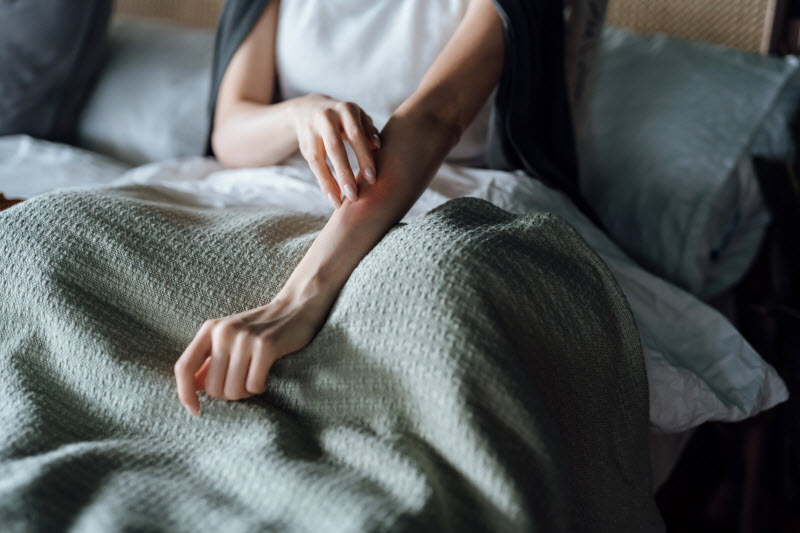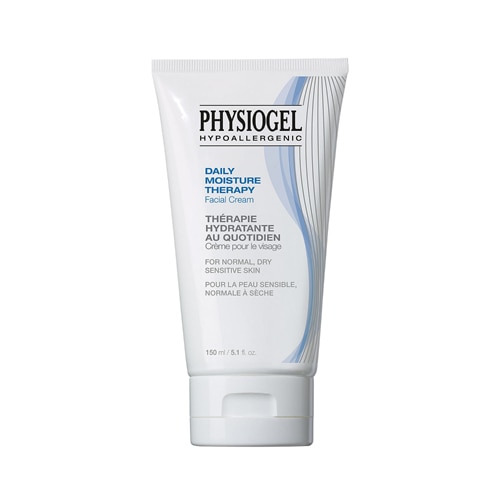[vc_row][vc_column][vc_column_text]
Eczema is an inflammatory condition that can cause itchy, dry, scaly skin with or without blisters or rashes. About
15% of children and 7.3% of adults in the U.S. have some form of eczema. Most people develop the condition before age six, but it also affects about one-quarter of adults in their 20s or over age 50.
Having eczema at any age can cause significant discomfort and affect your quality of life. But a combination of trigger management and home remedies can soothe your skin and help you control symptoms naturally.

Eczema: Symptoms, types and complications
Symptoms of atopic dermatitis, the most common type of eczema, vary depending on the condition's severity and extent. Your symptoms may "flare" and get worse for a while before dying down or disappearing. Flare frequency is also variable: Some people can
go for years without symptoms, while others struggle to get relief.
Eczema symptoms
During an eczema flare, you may experience:
- Itchiness
- Dry skin
- Rashes
- Bumps or blisters
- Swelling
- Oozing
- Flaky, crusty, or scaly skin
- Thick or leathery skin patches
- Skin color changes, including darkening of the skin under your eyes
Babies and children usually develop these skin symptoms on their necks or ankles or the insides of their elbows and knees. In
teens and adults, eczema typically affects the hands, neck, ankles, feet, skin around the eyes, or elbow and knee creases.
Types of eczema
If your symptoms don't match those of atopic dermatitis, or your rashes appear in different places, you may have one or more of the six other types of eczema, which include:
- Contact dermatitis, an itchy rash that results from triggers in the environment
- Dyshidrotic eczema, itchy blisters that develop on the hands and feet
- Nummular eczema, coin-shaped spots that itch, ooze, or crust
- Neurodermatitis, itchiness and rashes that occur in only a few patches on the body
- Seborrheic dermatitis, itchy patches and greasy scales on the scalp that are commonly known as dandruff
- Stasis dermatitis, skin discoloration on the legs and feet that develops due to lack of circulation
It's possible to have multiple types of eczema at the same time or in combination with food allergies, environmental allergies, asthma or other skin diseases.
Eczema complications
Eczema can increase your susceptibility to
bacterial and viral skin infections, especially if you scratch yourself raw or your skin splits due to dryness or rashes. You may also have trouble sleeping during flares when your skin itches more.
Eczema rashes and skin discoloration can affect appearance, which can lead to
self-consciousness. For children and teens, symptoms and symptom management may cause discomfort in social situations. Some people struggle with anger or depression related to the condition.
See a doctor right away if you experience symptoms of infection like swelling, fever, yellow scabs or colored drainage, or if you struggle with negative thoughts and emotions as a result of your eczema symptoms.
What causes eczema?
Eczema's development appears to result from a combination of
genetics and environment. Although the root cause is unknown, symptoms are related to the
skin's inability to retain moisture, which causes your
immune system to overreact to external and internal irritants, commonly called triggers.
External eczema triggers can include:
- Ingredients in personal care products
- Chemicals in household cleaners
- Fragrances in candles and other products
- Juice or liquid from foods
- Coarse fabrics
- Metals, especially nickel
- Dust mites and other allergens
- Damp or cold environments
- Seasonal weather changes
- Prolonged exposure to dry air
Internal triggers include:
- Stress
- Food allergies
- Hormonal changes
Researchers have attempted to figure out why some people have these sensitivities and others don't. One possible explanation is
"leaky skin:" a problem with the skin barrier that affects the junctions between cells, allowing pathogens and irritants to pass through and activate the immune system.
Whatever the cause,
eczema typically runs in families and is more likely to develop in people who have allergies, asthma, hay fever or other types of dermatitis.
Preventing eczema flares
Currently, there is no known way to prevent or cure eczema. However, you can reduce the possibility of flares by familiarizing yourself with your specific triggers and taking steps to avoid them.
Start by
keeping a symptom diary. Write down the date, your symptoms, and what you did or ate before those symptoms developed. In a few weeks, patterns should emerge that link certain foods, experiences, or environmental exposures to your symptoms. Make changes to your routine to remove or reduce these triggers.
These changes may include:
- Switching to fragrance-free, natural cleaners for your house and clothing
- Using fragrance-free, irritant-free soaps and personal care products
- Wearing gloves when you clean or cook
- Humidifying indoor air during dry seasons
- Protecting eczema-prone skin in extreme weather conditions
In addition to avoiding triggers, moisturizing your skin at least twice per day is an essential part of eczema management. Look for dermatologist-recommended products with
emollient ingredients. These products attract moisture, soften skin, soothe irritation, and prevent moisture loss. Apply moisturizer
after you shower, before bed at night, and whenever your skin feels dry.
Wet wrap therapy can also help your skin hold onto moisture. After moisturizing, wrap the affected area with cotton cloth or clothing damped in warm water. Cover this with a warm, dry layer, and leave both layers on for several hours or overnight.
Natural remedies for eczema
These home remedies for eczema can provide additional support for symptom control and relief:
- Sunflower seed oil has anti-inflammatory properties and may improve skin hydration and barrier integrity, but current evidence of its effectiveness is limited.
- Colloidal oatmeal creams and baths appear to improve symptoms of mild-to-moderate eczema, resulting in better quality of life.
- Vitamin D supplementation of 4000 IU per day in people with vitamin D deficiency may help balance immunity, support a healhy inflammatory response and promote skin barrier strength.† More evidence is needed to confirm these effects.
- Phototherapy may reduce redness, swelling, and itching in widespread or severe cases of eczema that don't respond to other treatments.
- Acupuncture may reduce symptom severity better than conventional eczema treatment, but the benefits appear to vary.
- Changing your diet to remove pro-inflammatory and allergenic foods may help, although no single dietary pattern has yet been shown to cure eczema.
What about other natural eczema remedies like coconut oil, apple cider vinegar and evening primrose oil? Although they're often cited as beneficial, science doesn't support the claims that these options can reduce eczema symptoms.
If you suspect you're developing eczema, or you experience new or worsening symptoms, see a dermatologist to discuss treatments and develop a management plan for consistent relief.
†These statements have not been approved by the Food and Drug Administration. These products are not intended to diagnose, treat, cure or prevent disease.
[/vc_column_text][/vc_column][/vc_row][vc_row][vc_column][vc_text_separator title="Featured Products" border_width="2"][vc_row_inner equal_height="yes" content_placement="middle" gap="35"][vc_column_inner width="1/3"][vc_single_image image="166432" img_size="full" alignment="center" onclick="custom_link" img_link_target="_blank" css=".vc_custom_1682634737438{padding-right: 7% !important;padding-left: 7% !important;}" link="https://www.vitacost.com/all-terrain-eczema-soothing-soap-8-oz"][/vc_column_inner][vc_column_inner width="1/3"][vc_single_image image="166431" img_size="full" alignment="center" onclick="custom_link" img_link_target="_blank" css=".vc_custom_1682634755082{padding-right: 7% !important;padding-left: 7% !important;}" link="https://www.vitacost.com/derma-e-eczema-relief-cream"][/vc_column_inner][vc_column_inner width="1/3"][vc_single_image image="166433" img_size="full" alignment="center" onclick="custom_link" img_link_target="_blank" css=".vc_custom_1682634773109{padding-right: 7% !important;padding-left: 7% !important;}" link="https://www.vitacost.com/vanicream-gentle-body-wash-for-sensitive-skin"][/vc_column_inner][/vc_row_inner][/vc_column][/vc_row]




